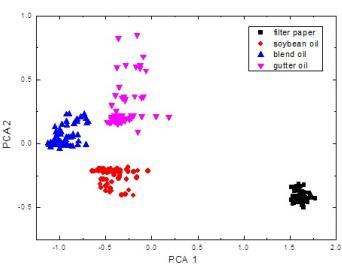Aug 28 2014
The illegal use of waste cooking oil in parts of the nationwide food system is threatening the public's health in China.
 This shows the PCA scores plot for three oils and clean support (filter paper). Credit: ©Science China Press
This shows the PCA scores plot for three oils and clean support (filter paper). Credit: ©Science China Press
Now scientists led by Professor Ding Hongbin at the Dalian University of Technology, in northeastern China, present a new means to confront this problem. In a study published in the Chinese Science Bulletin, Ding and fellow researchers at the university's School of Physics and Optoelectronic Engineering outline the potential use of laser-induced breakdown spectroscopy (LIBS) to rapidly distinguish between "gutter oil" and safe, edible oil.
Laser-induced breakdown spectroscopy is used to obtain spectral features of oil samples, which are subjected to principal component analysis (PCA). The researchers used an Artificial Neural Network (ANN) model during the analysis. This provides a new approach to detecting gutter oil efficiently and quickly.
Gutter oil is made from restaurant leftover oil, and circulates widely in China. Investigations of this toxic concoction have detected samples including harmful substances like bacteria, heavy metals, fatty acids, and even strong carcinogens like flavacol.
Long-term consumption of gutter oil can lead to liver ailments and cancer, as well as to developmental disabilities in newborns and children. Yet due to a lucrative trade in this toxic substance, producing and selling gutter oil persists despite the threat of severe punishment by the Chinese government.
This situation has grown in severity because of a longstanding difficulty in differentiating gutter oil from legitimate oil. Bleach is used to transform gutter oil's dark color into a more natural one and alkali additives are used to neutralize the abnormal pH caused by containing high rates of animal fats. Reports in the Chinese press have indicated that one in ten visits to a restaurant is likely to lead to the unwitting consumption of gutter oil.
Laser-induced breakdown spectroscopy can be used in the quantitative and qualitative analysis of solids, liquids and gases. In LIBS, a high-energy focused laser pulse is utilized as a vaporization and excitation source to create a plasma in front of a target surface. The laser-induced plasma generates a spectrum of ionic and atomic characteristic emission lines, which are used to identify the composition of each element in the sample.
LIBS has been regarded as a future superstar in terms of chemical analysis due to its unique features, such as requiring little or no sample preparation, remote sensing, and fast analysis of multiple elements.
The laser-induced breakdown spectroscopy instrument installed on NASA's Curiosity rover has successfully analyzed rock samples from up to 7 m away.
Back on Earth, Ding Hongbin and his research group have used LIBS technology to monitor fuel retention and the deposit of impurities on the first wall of fusion devices. LIBS has been used in extreme environments such as strong magnetic or electric fields and a strong radiation background.
In the new study, researchers stated that they used LIBS techniques to detect gutter oil for the very first time. Analysis software developed by the group automatically collects useful line signals from a single-shot LIBS spectrum (Fig.1). A data processing algorithm based on PCA is likewise used to detect gutter oil.
The resulting scores for the first two principal components are shown in Fig. 2, and predicted results are shown in table 1.